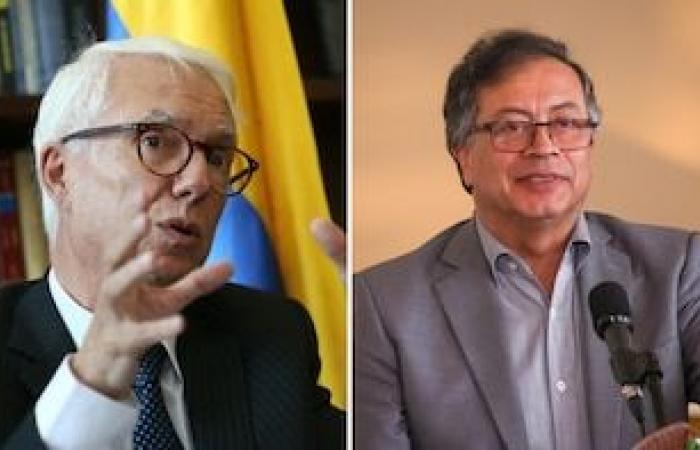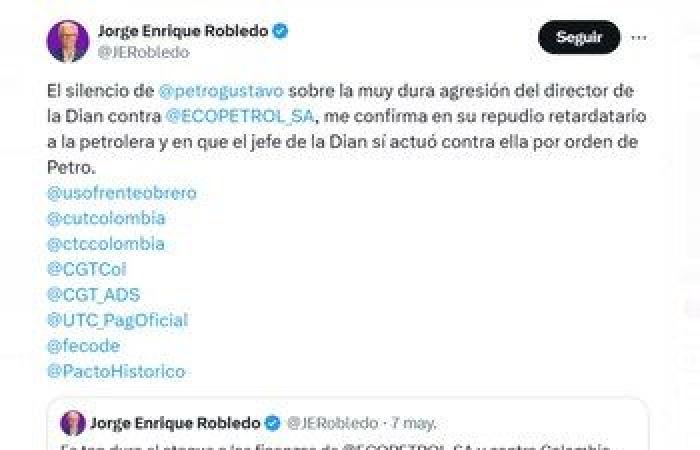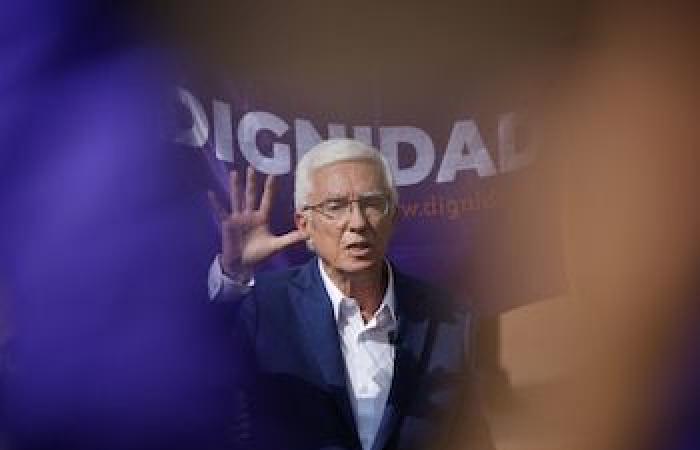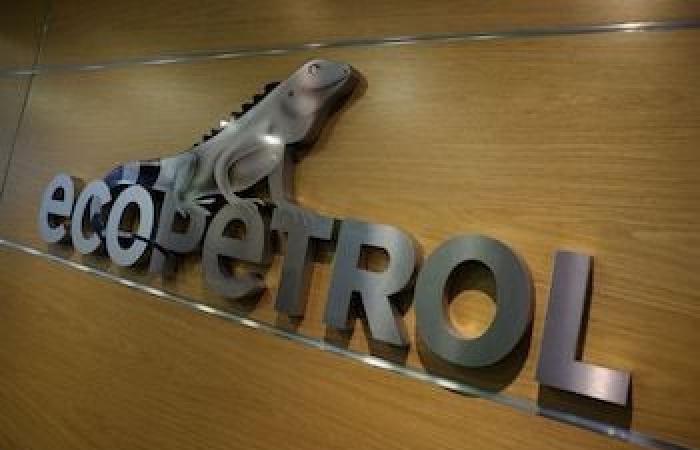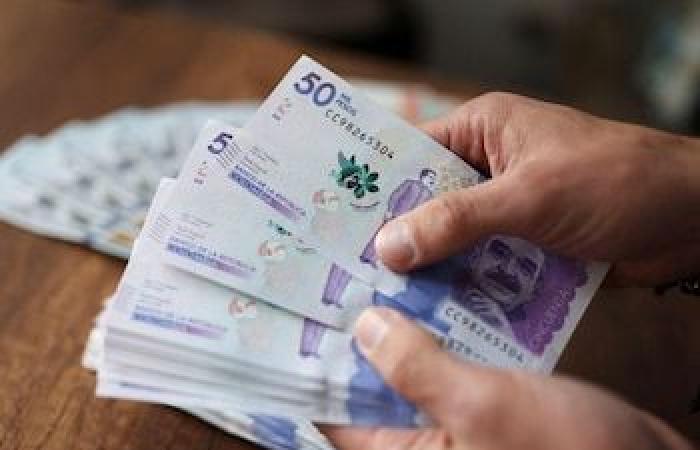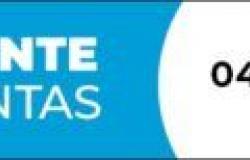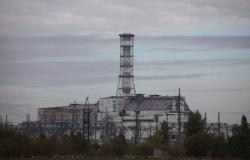In the midst of a growing public debate on the financial stability of Ecopetrol and the impact of recent tax decisions of the national government, the former presidential senator and excandidato Jorge Enrique Robledo launched a hard criticism against President Gustavo Petro, accusing him of keeping silent to what he described as an “irredemible attack” against the main state -owned company of the country.
The politician’s statements caused a new political controversy that puts in the center of the debate the relationship between the Executive and Ecopetrol, as well as the economic effects of measures adopted by the tax and financial authorities.
Now you can follow us in Facebook and in our WhatsApp Channel.
Through its official account in the Social Network X, Robledo said that the decisions taken by the Directorate of National Taxes and Customs (DIAN) and the Ministry of Finance against Ecopetrol, related to the collection of 9.4 billion pesos for Value Added Tax (VAT) for the importation of gasoline, could not have been executed without the endorsement of President Gustavo Petro.
“The attack on the finances of @ecopetrol_sa and against Colombia is so hard – until $ 30 billion – that it is not credible that the director of the @Diancolombia and the @minhacienda have decided it without the support of @Perogustovo, who knows each other to Ecopetrol and the oil (sic),” published the political leader in the social network.
According to Robledo, these measures not only affect the financial present of the company, but, in their interpretation, they are part of a deliberate strategy to weaken ecopetrol for political purposes.
“And the impact of the great sum that they want to take away from Ecopetrol does more harm because their finances are in trouble and because that money is to finance the electoral clientelism of Petro and Petrism! That Petro gives the face ”, He pointed out in his message.
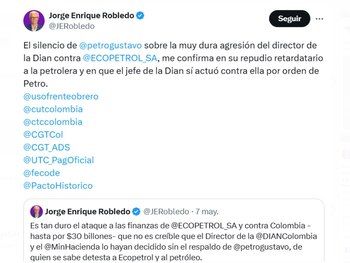
In a video broadcast intervention, the leader of the Dignity and Commitment Movement extended his accusation by stating that retroactive tax collection could even rise to 21 billion pesos, pushing the company “towards a deep crisis”.
Robledo argued that this situation is aggravated by factors such as the level of indebtedness of the company, An address that described as “lousima” under the command of Ricardo Roa and its Board of Directors, as well as the fall in the international price of oil.
In addition, Robledo questioned the recent operation in which Ecopetrol acquired bonds worth 7.7 billion pesos, which, in his words, constitutes another unjustified financial burden that threatens the sustainability of the company. For him, these decisions are not only “pernicious”, but they open the door to a possible privatization, an objective that associated with ancient interests of the neoliberal economic model.
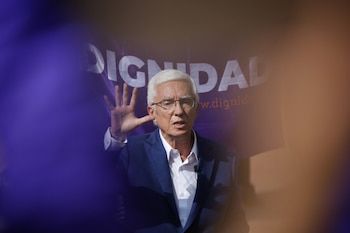
“At the same time, there is a fierce attack by the Minister of Finance to Ecopetrol, by putting this company to buy 7.7 billion pesos in bonuses in which they will lose great sums. These decisions are so pernicious that they can unfold Ecopetrol, facilitating the well -known and old neoliberal objective of privatizing it. Suspicious, right? ”Robledo added.
From their perspective, these measures are not taken in isolation, but respond to a defined ideological line within the current government. “And it is obvious that measures of this caliber origin in the decisions of President Gustavo Petro. So he and his correveidiles hide it. Because we are facing such a great sum in such an important company for Colombia that in no country moves without the orders of the Head of the State,” he emphasized.
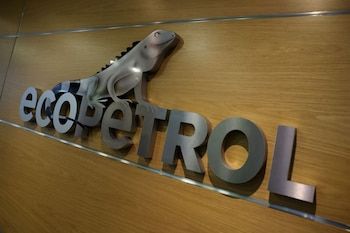
The statements of the political leader coincided with the dissemination of the financial report of the first quarter of 2025 by Ecopetrol. According to the document, the company obtained a net profit of 4.23 billion pesos, which represented a 16.6% drop compared to the same period of the previous year.
Given this situation, Ecopetrol announced that it will take legal measures against the DIAN requirement. In an official statement, the oil company said that “differs from the interpretation” of the regulations carried out by the Tax Authority and will respond in the next few days through the established legal mechanisms.
The amount required by the DIAN covers from 2022 to 2024, by virtue of a tax reform that, according to the entity, forces importing companies to pay VAT for fuels since 2016.
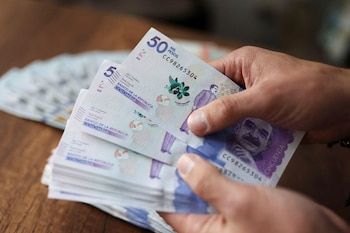
The controversy revived the debate on the energy policy of the current government, as well as on the financial management of state companies. Although the Executive has not issued formal statements against the accusations of Robledo, the silence indicated by the political leader was interpreted by his followers as a factor that increases uncertainty.


